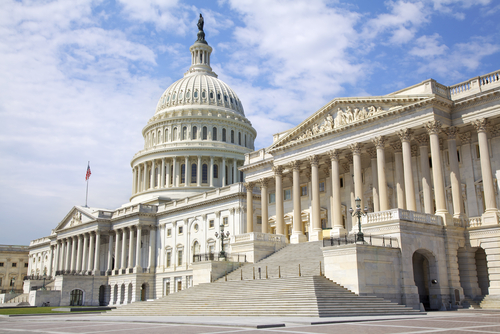A popular cannabis banking reform amendment offered by U.S. Rep. Ed Perlmutter (D-CO) that would provide protections to financial institutions serving legal cannabis-based businesses on Friday received approval from the U.S. House of Representatives as part of a larger bill.

The U.S. House voted 222-210 to approve Perlmutter’s bipartisan Secure and Fair Enforcement (SAFE) Banking Act as part of the America COMPETES Act, sweeping legislation to bolster America’s competitiveness with China and address the country’s shortage of semiconductors.
“I’m glad to see it included in the America COMPETES Act and I will keep pushing to ensure it remains in the final package negotiated with the Senate,” Perlmutter said following the House vote.
The SAFE Banking Act — which Perlmutter sponsored in March 2021 alongside 107 original House cosponsors and on Thursday got included as an amendment to the America COMPETES Act — would allow cannabis-related businesses in states with some form of legalized marijuana and strict regulatory structures to access the banking system and reduce the public safety risk in communities across the country.
The approval today marks the sixth time the House has passed the bill, most recently in December 2021 as part of the fiscal year 2022 National Defense Authorization Act. But despite significant support in the Senate, where the chamber’s version has 41 bipartisan cosponsors, the bill still has not been taken up for consideration.
That’s going to change, however, as policymakers in both the House and Senate now will work to reconcile the America COMPETES Act and its Senate counterpart, the United States Innovation and Competition Act.
Perlmutter said during a pre-vote press event this morning held jointly with U.S. Rep. Dave Joyce (R-OH) that conversations with Senate leadership about amending his legislation have been ongoing, particularly regarding equity issues supported by U.S. Senate Majority Leader Chuck Schumer (D-NY), who also wants to see a more comprehensive cannabis legalization bill put forth.
“This is the time to pass something that rationalizes banking” in this industry, Perlmutter said during the event. “At some point, the Senate’s got to do something — not just think they’re going to do something, but actually do it.”
Perlmutter also said this morning that despite his encroaching retirement after this congressional session ends, he’s going to press forward with his marijuana banking bill. And if it doesn’t survive the reconciliation process, then he’ll try to get it added into as many bills as possible.
“We’re going to get this passed,” he said, adding that other bills also will be coming out over the next month or two.
Perlmutter also reemphasized today that small and large cannabis-related businesses and their employees “are in desperate need of access to the banking system,” as well as access to capital in order to operate in an efficient, safe manner and compete in the growing global cannabis marketplace.
“The SAFE Banking Act is the best opportunity to enact some type of federal cannabis reform this year and will serve as the first of many steps to help ensure cannabis businesses are treated the same as any other legal, legitimate business,” he said.
Other SAFE Banking Act supporters reacted to the House-approved America COMPETES Act.
“We thank House members for including this bill in the bipartisan America COMPETES Act,” said Credit Union National Association President and CEO Jim Nussle. “This bill addresses an important public safety issue by providing legal businesses access to financial services.”
NORML Political Director Morgan Fox wrote in an online blog post on Friday that the SAFE Banking Act is only the first step toward making sure that state-legal marijuana markets operate safely, efficiently and fairly.
“But unfortunately, the sad reality is that those who own or patronize these currently unbanked businesses are still nonetheless recognized as criminals in the eyes of the federal government and by federal law,” Fox wrote. “This situation can only be rectified by removing marijuana from the list of controlled substances, and there are several pending legislative vehicles before Congress that can accomplish this goal.
“In the meantime, the passage of the SAFE Banking Act is a step in the right direction that will directly improve many people’s lives,” he wrote.
Along the same vein, the U.S. Cannabis Council tweeted today: “The lack of #SAFEBanking negatively impacts social equity and public safety. Small and minority-owned businesses are disproportionately impacted.”
Likewise, U.S. Rep. Jerry Nadler (D-NY) also today called for “urgently needed comprehensive federal marijuana reform legislation” in a tweet after the House vote.
“States have led the way in reforming our laws — including here in New York — but as long as there is a conflict with our federal laws, we must address this issue on a national level. It is time for us to act and right the wrongs caused by the failed war on drugs,” Nadler tweeted.
For its part, the National Association of Federally-Insured Credit Unions (NAFCU) does not have, and is not taking, a position on the broader question of the legalization or decriminalization of marijuana at the federal or state levels.
However, in a Feb. 2 letter sent by NAFCU Vice President of Legislative Affairs Brad Thaler to the House, he does support Congress taking steps found in the SAFE Banking Act to provide greater clarity and legal certainty at the federal level for credit unions that choose to provide financial services to state-authorized marijuana-related businesses and ancillary businesses that may serve those businesses in states where such activity is legal.